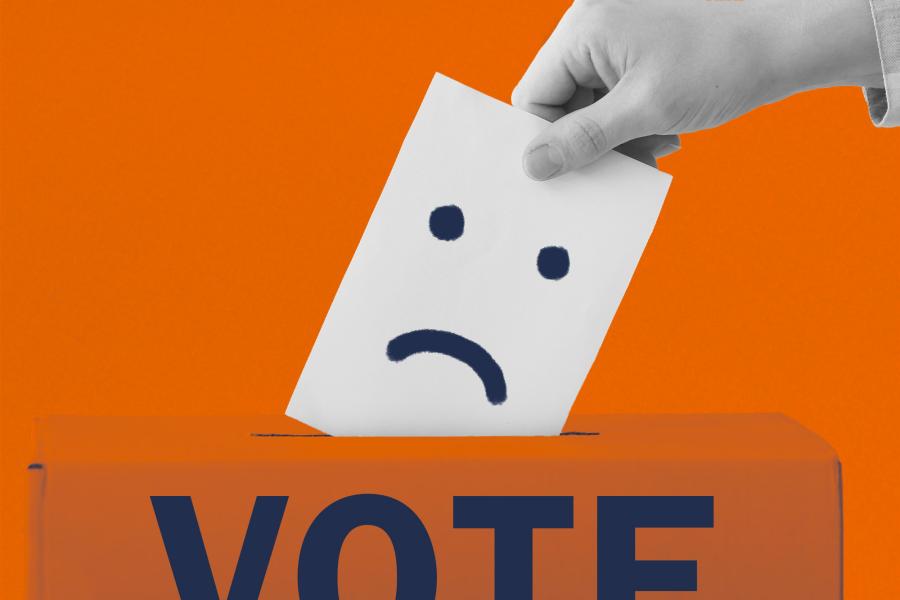Haley is currently Trump’s only major presidential primary opponent, and is not considered much of a challenge. In Iowa’s caucus, Haley finished third, with 19% of the vote compared to Trump’s 51% and DeSantis’ 21%. In the New Hampshire primary, Trump beat her 54.3% to 43.2%. In the Nevada Republican primary, in which Trump did not compete, Haley lost to “none of these candidates,” which took 63% of the vote compared to Haley’s 31% (Trump won the caucus, which actually awarded the state’s delegates and where Haley did not compete, with 99% of the vote).
So why does Haley continue running? Why are Republican donors still contributing millions of dollars to her campaign?
With hopes of finding out what is going on in presidential politics and why Haley remains steadfast about continuing her presidential bid, UVA Today reached out to Kyle Kondik, managing editor of “Sabato’s Crystal Ball,” the nonpartisan political newsletter of the UVA Center for Politics, and the center’s director of communications.
Q. Nikki Haley is the last Republican challenger to former president Donald Trump in the race for the GOP presidential nomination. How common is it for there to be so few candidates in the contest at this early stage of the campaign?
A. Presidential fields can get effectively winnowed very quickly. The 2016 Democratic race between Hillary Clinton and Bernie Sanders was just a two-person affair for the entirety of the nomination season. Eight years earlier, it didn’t take long for the race to become just Obama versus Clinton.
Trump has done what frontrunners often do – knock out rivals as he racks up victories. But Haley has hung around.
Looking ahead, it’s hard to see any real prospects of success for Haley. Polling indicates she is very likely to lose her home state, South Carolina, in an uncompetitive fashion this weekend.
It’s possible that she could compete to win a small state with a moderate electorate on Super Tuesday, like Massachusetts or Vermont, although even that seems unlikely. Trump’s campaign has argued that he could clinch a majority of delegates by the middle of March, given how many primaries are coming up soon.
Q. Haley has been soundly beaten in the recent GOP caucuses and primaries, but has raised a reported $11.5 million in January. Why are donors still contributing?
A. I wouldn’t presume to speak for the donors, although there is clearly a big money segment of the GOP that would prefer a different nominee. Part of what can push a candidate toward the exits is running out of money, but if Haley continues to have funding, it makes it easier for her to continue in the race.
Perhaps there is some hope among the non-Trump Republicans that Trump will suffer some sort of debilitating setback – maybe related to his legal problems – that will significantly depress his support. But that seems like wishful thinking, if that is what is indeed motivating these donors.
If Haley stays in, she could hypothetically be the nominee if Trump somehow left the race between now and the convention. But that increasingly depends on Trump getting out on his own volition, which seems highly unlikely.
And, even if Trump did get out, Trump-supporting delegates would still likely dominate the Republican National Convention. My guess is if they had to pick a replacement candidate, they wouldn’t go with Haley, a Trump critic.
Q. Often opposing candidates will come together after campaigns to form a united front for the general election. That does not appear likely to happen with these two candidates. Are we seeing a rift forming in the party?
A. I think it’s still quite possible that Haley will eventually drop out and endorse Trump. We have seen plenty of critics of Trump eventually turn around and back him. Regardless of whether Haley eventually backs Trump, Trump does seem likely to enjoy a high level of party unity in the general election, although any erosion might be important in what could very well be another close and competitive general election.
Q. Are there any lessons to learn, any takeaways, any predictions for the future that can be made from the primary season so far?
A. This is an unusual election in that we have a real incumbent without meaningful challengers (Biden) against a quasi-incumbent who has clearly risen above a stronger field of challengers (Trump). It could be the first time in the modern history of presidential nominations (dating back to the 1970s) in which both major-party nominees will have won every single party nominating contest.
The unusual nature of this cycle probably does not hold many lessons for the future. Come 2028, we are very likely to have competitive open-seat nominating contests on both sides.











